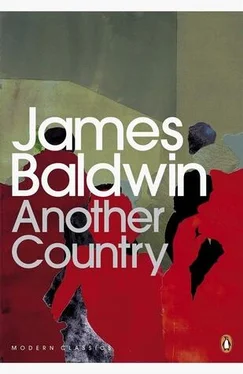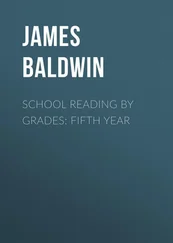“Later, she says that she do it for me, that we would not have eaten otherwise. But I do not believe that. I think she liked that. I think she was always a whore. She always managed everything that way. When the Americans came, she found a very pretty officer. He was very nice to me, I must say — he had a son of his own in the States that he had only seen one time, and he pretended that I was his son, though I was much older than his son would have been. He made me wish that I had a father, one father, especially”—he grinned—“an American father, who liked to buy you things and take you on his shoulder everywhere. I was sorry when he went away. I am sure that it was he who kept her from getting her head shaved, as she deserved. She told all kinds of lies about her work in the Resistance. Quelle horreur! that whole time, it was not very pretty. Many women had their heads shaved, sometimes for nothing, you know? just because they were pretty or someone was jealous or they had refused to sleep with someone. But not my mother. Nous, nous étions tranquille avec nôtre petit officier and our beefsteak and our chocolate candy.”
Then, with a laugh:
“Now, she owns that bistro where she used to work. You see what kind of woman she is? I never go there.”
This was not entirely true. He had run away from his mother at fifteen. Or, more accurately, they had established a peculiar truce, to the effect that he would make no trouble for her — that is, he would stay out of the hands of the law; and she would make no trouble for him — that is, she would not use his minority status as a means of having him controlled by the law. So Yves had lived by his wits in the streets of Paris, as a semi- tapette, and as a rat d’hôtel, until he and Eric had met. And during all this time, at great intervals, he visited his mother — when he was drunk or unbearably hungry or unbearably sad; or, rather, perhaps, he visited the bistro, which was different now. The long, curving counter had been replaced by a long, straight one. Neon swirled on the ceiling and above the mirrors. There were small, plastic-topped tables, in bright colors, and bright, plastic chairs instead of the wooden tables and chairs Yves remembered. There was a juke box now where the soldiers had clumsily manipulated the metal football players of the baby-foot; there were Coca-Cola signs, and Coca-Cola. The wooden floor had been covered with black plastic. Only the WC remained the same, a hole in the floor with footrests next to it, and torn newspaper hanging from a string. Yves went to the bistro blindly, looking for something he had lost, but it was not there any longer.
He sat in the old, vanished corner and watched his mother. The hair which had been brown was now of a chemical and improbably orange vitality. The figure which had been light was beginning to thicken and spread and sag. But her laugh remained, and she still seemed, in a kind of violent and joyless helplessness, to be seeking and fleeing the hands of men.
Eventually, she would come to his end of the bar.
“ Je t’offre quelque chose, M’sieu? ” With a bright, forced, wistful smile.
“ Un cognac, Madame .” With a wry grin, and the sketch of a sardonic bow. When she was halfway down the bar, he yelled. “ Un double! ”
“ Ah! Bien sûr, M’sieu. ”
She brought him his drink and a small drink for herself, and watched him. They touched glasses.
“ A la vôtre, Madame. ”
“ A la vôtre, M’sieu. ”
But sometimes he said:
“ A nos amours. ”
And she repeated dryly:
“ A nos amours! ”
They drank in silence for a few seconds. Then she smiled.
“You look very well. You have become very handsome. I’m proud of you.”
“Why should you be proud of me? I am just a good-for-nothing, it is just as well that I am good-looking, that how I live.” And he watched her. “ Tu comprends, hein? ”
“If you talk that way, I want to know nothing, nothing, of your life!”
“Why not? It is just like yours, when you were young. Or maybe even now, how can I tell?”
She sipped her cognac and raised her chin. “Why don’t you come back? You can see for yourself how well the bar does, it would be a good situation for you. Et puis —”
“ Et puis quoi? ”
“I am no longer very, very young, it would be un soulagement if my son and I could be friends.”
And Yves laughed. “You need friends? Go dig up some of those that you buried in order to get this bar. Friends! Je veut vivre, moi! ”
“Ah, you are ungrateful.” Sometimes, when she said this, she dabbed at her eyes with a handkerchief.
“Don’t bother me any more, you know what I think of you, go back to your clients.” And the last word was thrown at his mother, like a curse; sometimes, if he were drunk enough, there were tears in his eyes.
He would let his mother get halfway down the bar before he shouted.
“ Merci, pour le cognac, Madame! ”
And she turned, with a slight bow, saying,
“ De rien, M’sieu. ”
Eric had been there with him once, and had rather liked Yves’ mother, but they had never gone back. And they had scarcely ever spoken of it. There was something hidden in it which Yves did not want to see.
Now, Yves leapt over the low stone wall and entered the garden, grinning.
“You should have come in the water with me, it was wonderful. It would do wonders for your figure; do you know how fat you are getting?”
He flicked at Eric’s belly with his bikini and fell on the ground beside him. The kitten approached cautiously, sniffing Yves’ foot as though it were investigating some prehistoric monstrosity, and Yves grabbed it, holding it against his shoulder, and stroking it. The kitten closed its eyes and began to purr.
“You see how she loves me? It is a pity to leave her here, let us take her with us to New York.”
“Getting you into America is going to be hassle enough, baby, let’s not rock the boat. Besides, New York is full of alley cats. And alleys.” He said this with his eyes closed, drinking in the sun and the odors of the garden and the dark, salty odors of Yves. The children from the nearby house were still on the beach; he could hear their voices.
“You have no sympathy for animals. She will suffer terribly when we go away.”
“She’ll recover. Cats are much stronger than people.”
He kept his eyes closed. He felt Yves turn to look down at him.
“Why are you so troubled about going to New York?”
“New York’s a very troubling place.”
“I am not afraid of trouble.” He touched Eric lightly on the chest and Eric opened his eyes. He stared up into Yves’ grave, brown, affectionate face. “But you are. You are afraid of trouble in New York. Why?”
“I’m not afraid, Yves. But I have had a lot of trouble there.”
“We have had much trouble here, too,” said Yves, with his abrupt and always rather shocking gravity, “and we have always come out of it and now we are better than ever, I think, no?”
“Yes,” said Eric, slowly, and watched Yves’ face.
“Well, then, what use is there to worry?” He pushed Eric’s hair back from his forehead. “Your head is hot. You have been in the sun too long.”
Eric grabbed his hand. The kitten leapt away. “Jesus. I’m going to miss you.”
“It is for so short a time. You will he busy, I will be in New York before you know we have been apart.” He grinned and put his chin on Eric’s chest. “Tell me about New York. You have many friends there? Many famous friends?”
Читать дальше












